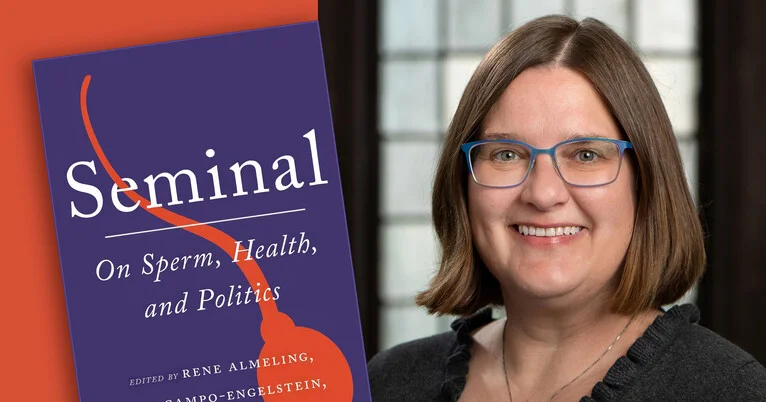
New perspectives on the intersection of sperm, health, and reproductive politics
How did your country report this? Share your view in the comments.
Diverging Reports Breakdown
New perspectives on the intersection of sperm, health, and reproductive politics
Yale sociologist Rene Almeling and a group of co-editors argue that a deeper understanding of the relationship between sperm, health, and politics is necessary to enable a more reproductively just society. The book, “Seminal: On Sperm, Health, and Politics” (New York University Press), features essays by experts from across the social sciences, humanities, law, and medicine. They examine the latest technological developments for creating sperm; the specter of eugenics in contemporary medical markets; emerging approaches to male contraception, male infertility, and trans health care. Almeling: If we continue to think about reproduction as solely a “women’s issue” or women’S responsibility, we’ll miss an important part of the reproductive equation. She also discusses the prospects for integrating male reproductive healthcare into the American health system, and the potential for new male contraceptives coming to market.
But in a provocative new collection of essays, Yale sociologist Rene Almeling and a group of co-editors argue that a deeper understanding of the relationship between sperm, health, and politics is necessary to enable a more reproductively just society.
The book, “Seminal: On Sperm, Health, and Politics” (New York University Press), features essays by experts from across the social sciences, humanities, law, and medicine on the relationship between sperm, health, and the intersecting politics of gender, race, and reproduction.
They examine a range of topics, including the latest technological developments for creating sperm; the specter of eugenics in contemporary medical markets; emerging approaches to male contraception, male infertility, and trans health care; and controversies surrounding sperm donation and sperm banking.
In her award-winning 2020 book, “GUYnecology: The Missing Science of Men’s Reproductive Health” (University of California Press), Almeling traced how the medical profession has historically paid little attention to male reproductive health and examined the implications of this gap for individuals, the health care system, and society more broadly. After its publication, she connected with Lisa Campo-Engelstein, chair of bioethics and health humanities at the University of Texas-Medical Branch, and Brian T. Nguyen, an OBGYN and program director for the fellowship in complex family planning at the University of Southern California, who were also studying male reproductive health. The three began a conversation that ultimately led them to coedit the new volume.
Almeling, professor of sociology in Yale’s Faculty of Arts and Sciences, recently spoke with Yale News about the need for interdisciplinary conversations on male reproductive health, the prospects for integrating male reproductive healthcare into the American health system, and the potential for new male contraceptives coming to market. The interview has been edited and condensed.
The book includes think pieces from an interdisciplinary group of scholars representing a broad range of disciplines. How did it come together?
Rene Almeling: The first step was a series of Zoom chats during the height of the pandemic with Lisa Campo-Engelstein and Brian T. Nguyen, both of whom I was meeting for the first time. From those initial discussions, we decided to organize an interdisciplinary workshop at Yale on issues surrounding male reproductive health, with the hopes it would lead to an edited volume.
We argue in the book that sperm is both biological and social, which is why it is so important to engage thinkers from multiple disciplines. We ended up hosting about 35 scholars from a variety of fields, including sociologists, philosophers, law professors, and physicians trained in a range of different specialties.
We asked everyone to write a thousand words on what they thought of as the most important issues in the United States at the intersection of sperm, health, and politics. We circulated the draft essays to all participants before we met, which meant that people walked in the door having made an initial argument. And everybody had a sense of everybody else’s stance. After the workshop, each author revised their think piece based on our day of interdisciplinary conversation, and the book took shape from there.
What are some potential avenues for reframing our conception of reproductive health to include men?
Almeling: If we continue to think about reproduction as solely a “women’s issue” or women’s responsibility, we’ll miss an important part of the reproductive equation. Several essays focused on how to incorporate male reproduction into the health care system and reproductive politics. There is just no easy answer to those questions. While “reproductive health” is technically a gender-neutral term, most of the people who provide it are trained as OBGYNs and only treat those assigned female at birth.
It requires a systematic overhaul of medical education, medical specialization, and the provision of medical care. Several physicians who contributed to the volume shared different ideas for how to do that. Pediatricians David Bell and Arik Marcell each wrote an essay based on their decades of work incorporating teen boys into reproductive and sexual health care and education. Brian T. Nguyen, one of the co-editors, also contributed an essay about his innovative EMERGE Framework, where he details how different aspects of OBGYN care can be translated for male bodies.
